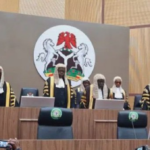Contrary to the expectation of the world population, the new world order has been characterized by more unstable and turbulent conflict situation, unhealthy power politics, destructive ethnic insurgencies, national rivalries, religious bigotry, government hypocrisy and endemic poverty, manufactured by globalization. Terrorism on the other hand has assumed a new dimension with its characteristic innovative contradictions, which has posed a greater threat to the world peace and security. What a new world disorder!
This violent disorder is said to have created and increased refugee flows and an army of internally displaced persons in the contemporary world.
Furthermore, the most disturbing part of the IDPs story is the fact that at the receiving end of this world disorder is Africa, where the continent is said to be the leading provider of internally displacements and the largest generators of influx of refugee in the world.
According to the UNHCR in the year 2011, Africa contributed almost eleven million internally displaced persons. This implies that war and violent conflict between two or more nations had lowered, compared to conflict and violence which had occurred within the same country. This internal conflict and violence manifest in form of religious violence, communal clashes, political violence, pre and post-election violence, riots, etc.
It is worth to also note that some of these conflicts are completely internal, while others are influenced by foreigners, but it is mostly believed that, most internal conflict that had occurred and still occurring in Africa has some foreign influences in most cases.
Using Nigeria as an example, it could be said that the highest contributor to the internally displaced persons in the country are the Nigerian Government, from federal to state governments. It is worth to note that, since the emergence of the democratic government in 1999, the rate of the internally displaced person in Nigeria has grown beyond measure with unfavourable government policies, notably among them is the destructive demolition of houses, streets, villages and even an entire community without providing any alternative to the teeming population.
Before the advent of governments’ unfavourable policies in recent times, riots in places like Kano and Kaduna have always been a major provider of internally displaced persons, communal clashes in Osun state between Modakeke and Ife, and in Kwara state between Offa and Erin Ile have also contributed, but since the demolition exercise which had displaced close to 3 million people in Abuja begun in the Federal Capital Territory under the watch of the then president Olusegun Obasanjo and Minister of FCT Mallam Nasir Elrufai, the story has not remain the same.
It was reported that Elrufai rolled out bulldozer and demolished thousands of houses in Abuja in the name of correcting the master plan. He was said to have demolished more than 300,000 houses. In this exercise, many landlords were reportedly demolished with their homes even though they had genuine papers from Abuja authorities. After the demolition, some people slept and never woke up, they died of heart attack. Some were paralysed by shock received from the incident and remained on the wheel chair till date, some were not so lucky, as they died while trying to pick up the pieces of their lives, while many others fled to others places to constitute what we call the internally displaced persons (IDPs). The government is said to have successfully made the city beautiful, while destroying million of its citizens.
Furthermore, the present FCT minister, Bala Muhammed had also revealed that he had demolished 126,000 houses since the beginning of the Jonathan led administration. If each of these building are occupied by at least 5 people, the Jonathan led federal government had also displaced 620,000 people within 2010 to 2012, which the total of displaced persons amount to 2.12million. Reports have it that many women in the course of walking around without homes became prostitutes.
Similarly, It was also reported that as at last count around 5 million Nigerians had been displaced by the mismanagement of two dams in Cameroon and many other dead.
Also, The FCT Administration had also vowed to demolish another 19 villages in the satellite areas of Abuja in 2012, an exercise that was widely criticised by the civil society organizations. The victims cried out and took the issue to court restraining the FCTA from commencing the demolition, but the minister vows to continue the exercise, as he promised to get the go ahead from the court of law.
Also, several states in Nigeria like Lagos, Oyo, Osun, Ogun, Ondo, Kwara etc had also embarked on similar demolition exercises; notable among them is Lagos State under Governor Babatunde Raji Fashola, where over 1 million people have also been displaced from the demolition of Ijora, Oshodi, Makoko and many other communities. Also, IDPs could be found during the religious skirmishes in the northern Nigeria. The more recent of such examples is the on-going crisis in northern Nigerian with the members of the Boko haram sect, which affected no less than 6 states which include, Borno, Yobe, Gombe, Plateau, Kano, Kaduna and Niger state.
In the south, Nigeria had some bad tales as well, and notable among them were Idi- Araba crisis in Lagos, where several persons were displaced, Sagamu crisis in Ogun state, Anambra and Osun crisis among others. It is worth to note that many of these victims were never recorded as the government didn’t consider them as IDPs, they left them uncared for, making their lives more complicated. Therefore, the IDPs are said to be those people who, by the virtue of fear of further attacks, or revenge by the rural groups or disputants, which they feel may cause harm or injury to them, decide to relocate to another area where they feel they can enjoy relative peace and tranquillity. They could also be people, whose home or places of work were demolished by their government without any alternative provided.
It is also important to note that, natural disasters such as flood have cause people to be internally displaced in Nigeria, examples can be seen in the 2012 flood, which affected several states like Bayelsa, Lagos, Oyo, Kogi, Kwara and many others.
In conclusion, having identified the causes of IDPs and its effects, it was observed that one appreciative offer that one can give to the homeless is shelter and basic needs such as food, cloth, water and so on.
Apart from these supplies, the internally displaced person needs to be counselled, cared for and assisted to overcome the emotional traumatization that is usually associated with such nasty experience.
In a situation where the government which should serve as the primary source of support for the needs of the IDP becomes the number one contributor to creating IDP’s in the country without any meaningful support or alternative provision, it becomes difficult and complicated. Apart from the fact that, this government attitude is a contradiction to the principle of human right as declared by the United Nation and signed by all nations across the world, it is also against human reasoning that any government would intentionally displace its own people in the name of creating a beautiful city.
Finally, human right organizations, well-wishers and concerned citizens must put the affected victims in their shoes and provide the needed support as much as we can.
Hamzat can be reached at: [email protected]
Internally displaced persons and the society
Contrary to the expectation of the world population, the new world order has been characterized by more unstable and turbulent conflict situation, unhealthy power politics,…



